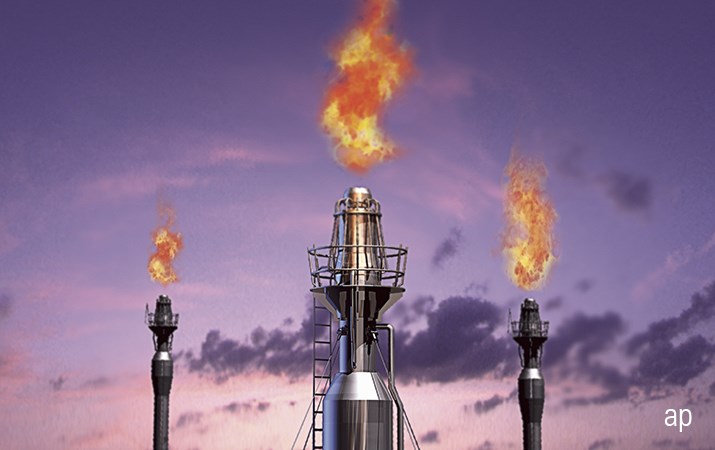
A 30% daily crash in the price of crude oil, the biggest fall since the 1991 Gulf War, has smashed the price of UK-listed oil companies BP and Shell and dragged down the FTSE 100 on Monday morning.
WTI and Brent crude were down 30% at the start of the day after Saudi Arabia effectively triggered an oil price war with Russia by saying it will ramp up production. Oil prices have already been hit hard this year as the spread of the coronavirus has triggered fears of a global recession. Saudi Arabia, which is part of the Opec cartel, had wanted to cut output in response to the global crisis but non-Opec member Russia did not support the move.
The FTSE 100 lurched 8% lower at the open after the slump in the oil price but recovered slightly to just above 6,000 points – at the start of the year the index of blue-chip companies was above 7,600 points. Global stock markets also saw sharp corrections: Japan’s Nikkei closed down 5% higher on the day, a fall of 1,000 points to 19,698, while Hong Kong’s Hang Seng closed 4% lower at 25,040, a drop of 1,100 points on Friday’s close.
FTSE 100 oil shares saw some staggering one-day moves: BP (BP.) shares are off nearly 20% at 323p, revisiting levels last seen 10 years ago after the Deepwater Horizon disaster. Royal Dutch Shell (RDSB) is down nearly 15% at £13.63, hitting January 2016 levels. Oil firms lower down the market have also suffered severe price falls: shares in Tullow Oil (TLW) fell over 30% on Monday to 16p (in 2020 they were above £15 a share), oil services company John Wood Group (WG) is off over 15% at 271p, and Petrofac (PFC) is off a similar amount at 228p.
The FTSE All-Share is now in bear market territory, notes AJ Bell’s investment director Russ Mould, the eleventh time it has done so since 1962. A bear market is when an index falls 20% from its recent peak. Mould notes that it has taken the broader FTSE All-Share just over 50 days since the General Election bounce to fall into bear territory. The consolation for investors is that bear markets, although unpleasant, are often short. The FTSE All-Share is off
Oil Weakness Spells Trouble
BP and Shell, as well as being big dividend payers and important for pension funds’ income, because of their make up a large part of the market-cap weighted FTSE 100 index. Shell is the biggest company in the index and BP comes in at number five.
IG senior market analyst at IG, Josh Mahoney, argues that the Saudi-Russia standoff may be a “temporary spat” which will be resolved soon, but the timing of the disagreement has been toxic with global markets on high alert.
Still, he says that investors are rightly worried about the ripple effect of crude’s weakness:
“The crash in oil prices has huge ramifications globally, with the financial viability of various businesses and countries coming into question. Very few can carve out a profit at $35 per barrel, and while those with cash stockpiles can weather the storm, we could be faced with significant ramifications for those that cannot.”
John Redwood, chief global strategist at Charles Stanley, thinks the effect on oil companies will be bad news for investors: "There will be cancelled investment programmes by oil companies, loss of business by oil service companies, and severe pressures on cashflows for high cost oil producers. We should expect dividend cuts, capital reorganisations and even bankruptcies amongst the weaker players."
Funds and trusts exposed to commodities have also fallen sharply at the start of the week.
The fall in oil prices is potentially beneficial for airline companies, for whom oil is its largest variable cost; but this will be little comfort at time when the expected slump in tourism is expected to blow a hole in their revenues. Shares in BA and Iberia owner IAG are down 35% since the start of the year to 414p, while shares in budget carrier easyJet are off 32% at £9.70, while leading cruise operator Carnival is down 50% since the start of the year.
One other potential winner from an oil price slump would be India, which is a big importer of the black stuff. Still, a global recession – and one that would disproportionately affect tourism and Asian companies – would outweigh any benefit from cheaper fuel.




























